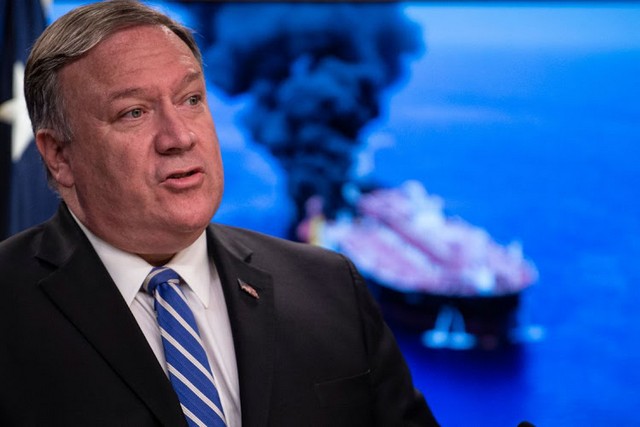United States Secretary of State Mike Pompeo says America believes Iran is responsible for attacks on oil tankers in the Gulf of Oman, based on its intelligence of the type of weapons used and level of expertise needed to execute the strikes.
He offered no concrete evidence to back up the assertion, while the US military said the navy destroyer USS Mason was on its way to the scene of the attacks.
“It is the assessment of the United States Government that the Islamic Republic of Iran is responsible for the attacks that occurred in the Gulf of Oman today,” Mr Pompeo said.
“This assessment is based on intelligence, the weapons used, the level of expertise needed to execute the operation, recent similar Iranian attacks on shipping, and the fact that no proxy group operating in the area has the resources and proficiency to act with such a high degree of sophistication.”
Two oil tankers were attacked on Thursday and left adrift in the Gulf of Oman.
One operator said it suspected its ship had been hit by a torpedo, while another shipping firm said its vessel was on fire in the Gulf of Oman.
The White House said President Donald Trump had been briefed and the US Government would continue to assess the situation.
Washington accused Tehran of being behind a similar attack on May 12 on four tankers in the same area, a vital shipping route through which much of the world’s oil passes.
Tensions between Iran and the US, along with its allies including Saudi Arabia, have risen since Washington pulled out of a deal last year between Iran and global powers that aimed to curb Tehran’s nuclear ambitions.
Iran has repeatedly warned it would block the Strait of Hormuz, near where the attacks happened, if it cannot sell its oil due to US sanctions.
No-one has claimed Thursday’s attacks and no-one has specifically blamed them on any party.
World ‘cannot afford’ a Gulf conflict: Guterres
Oil prices surged by 4 per cent after the report, further stoking tensions following attacks last month on Gulf oil assets amid a dispute between Iran and the US over Tehran’s nuclear program.
The Gulf of Oman lies at the entrance to the Strait of Hormuz, a major strategic waterway through which a fifth of global oil consumption passes from Middle East producers.
There was no immediate confirmation from authorities in Oman or the United Arab Emirates, in whose territorial waters four tankers were hit last month.
US and Saudi officials blamed Iran for the May attack, a charge Tehran has denied.
UK Foreign Minister Jeremy Hunt said the tanker attacks were worrying and any Iranian involvement would be a “deeply unwise escalation”.
The “unfounded” US claim over the attacks has been rejected by Iran’s mission to the United Nations after Washington blamed Tehran.
“Iran … condemns it in the strongest possible terms,” the Iranian mission said in a statement.
Iranian Foreign Minister Mohammad Javad Zarif has described the incidents as “suspicious” and called for regional dialogue.
The Saudi-led military coalition, which is battling the Iran-aligned Houthis in Yemen, described Thursday’s events as a “major escalation”.
Russia, one of Iran’s main allies, was quick to urge caution, saying no-one should rush to conclusions about the incident or use it to put pressure on Tehran.
United Nations Secretary-General Antonio Guterres told a meeting of the UN Security Council on cooperation between the UN and the League of Arab States: “Facts must be established and responsibilities clarified.”
He warned that the world cannot afford “a major confrontation in the Gulf region”.
Council diplomats said the US told them it planned to raise the issue of “safety and freedom of navigation” in the Gulf during a closed-door meeting of the Security Council later on Thursday.
“It’s unacceptable for any party to attack commercial shipping and today’s attacks on ships in the Gulf of Oman raise very serious concerns,” acting US ambassador to the UN Jonathan Cohen told the UN meeting.
All shipping crews have been safely evacuated
Bernhard Schulte Shipmanagement said tanker Kokuka Courageous was damaged on Thursday while on passage from Saudi Arabia to Singapore in a “suspected attack” that breached the hull above the water line.
“The ship is safely afloat,” it said in a statement.
Japan’s Trade Ministry said the two vessels had “Japan-related cargo” as Prime Minister Shinzo Abe was wrapping up a high-stakes visit in Tehran that sought to ease tensions between Iran and the US.
Taiwan’s state-owned petroleum company CPC said tanker Front Altair, carrying 75,000 tonnes of petrochemical Naphtha, was “suspected of being hit by a torpedo” at about 4:00am.
Frontline, the Norwegian company that owns the vessel, said it was on fire in the Gulf of Oman.
Sources said crews from both vessels, which they had said had been struck in international waters, had been safely evacuated.
One shipping broker said there had been an explosion “suspected from an outside attack” that may have involved a magnetic mine on the Kokuka.
“All crew safely abandoned the vessel and was picked up by Vessel Coastal Ace. Kokuka Courageous is adrift without any crew on board,” the source said.
Another source said the Front Altair reported a fire caused by a “surface attack” and that the crew had been picked up by nearby vessel Hyundai Dubai.
Saudi Arabia and the UAE said the May attacks on oil assets in the Gulf posed a risk to global oil supplies and regional security.
13 June 2019
Source: www.abc.net.au

